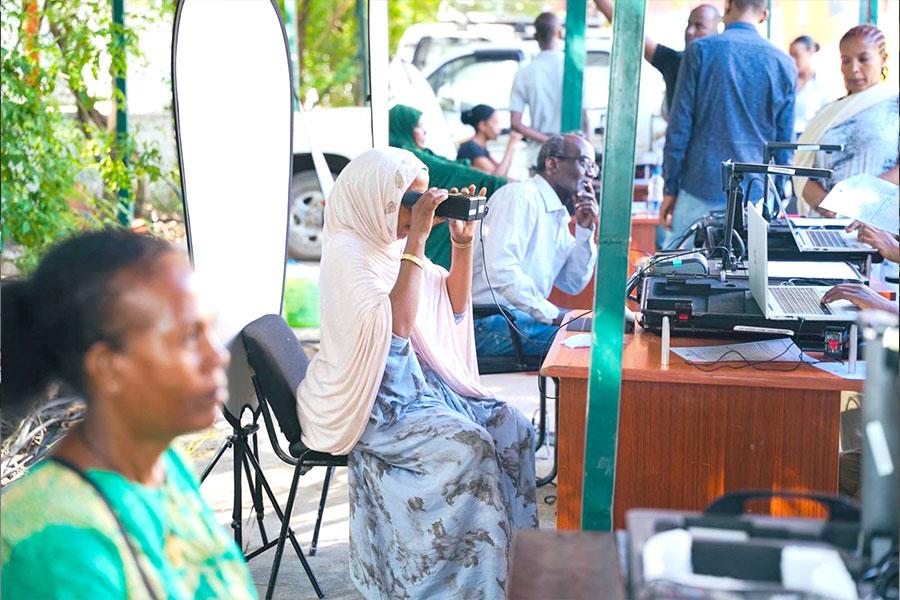
Radar | Jul 18,2021
Regulators at the National Bank of Ethiopia (NBE) have ordered digital remittance platforms working with the Bank of Abyssinia (BoA) cease operations. Earlier this month, a letter compelled the Bank to stop using the CashGo and MamaPays platforms for remittance services.
The Foreign Exchange Monitoring & Reserve Management of the National Bank summoned Abyssinia to clarify the legality of the remittance operations through the apps and what distinguishes them from traditional money transfer services.
CashGo is a digital remittance services platform provided to Abyssinia Bank by Sol-Get Travel a year ago. The app has been integrated with Visa and Mastercard to allow people abroad to transfer funds directly to accounts with Abyssinia, deposited in Birr. It also offers a feature for raising donations to various organisations listed on the platform.
The app has been active for half a year and has been facilitating a daily transfer of 50,000 dollars, according to Tewodros Shiferaw, a co-founder.
CashGo is thus far not taking commission fees, a departure from traditional remittance services that can charge as much as 12pc.
Regulators at the central bank say neither Abyssinia nor the tech firms and payment companies hold valid permits to offer remittance services through the app. They contend a 'representative' can only engage in remittance services partnering with a fintech company holding an international remittance service provider license. The requirement is outlined in a directive issued last year, which defines representatives as banks, the postal service, payment instrument issuers or other financial institutions granted the status by the central bank.
"I expected the central bank to recognise our contribution instead of proscribing us," said Tewodros.
Tewodros claims the operations do not violate the directive as Abyssinia holds a remittance license, and CashGo is a technology provider, not a fintech company.
In traditional remittance services, banks serve as agents to service providers registered. Nonetheless, Tewodros says it is impossible to shut down the CashGo system immediately as ongoing payments have yet to be settled. Abyssinia Bank has requested five days to clear payments in the process.
Central bank officials have consented, according to him. The deadline has been moved to Monday.
The Commercial Bank of Ethiopia (CBE) had also agreed to partner with CashGo, but the services have since been paused. Executives from the CBE and BoA met with regulators last week, briefing the latter on the application's functionality. However, a decision was not made on the future of the platforms.
The other platform in jeopardy is MamaPays, an app developed by BelCash and launched in tandem with Bank of Abyssinia's e-commerce gateway. It allows receivers to request payments from senders. Users can connect to their accounts with Abyssina and Somali Microfinance. When a user requests payment, the app automatically generates a link through which the sender can settle. Senders can use Visa and Mastercard.
Vincent Diop, chief executive officer (CEO) of BelCash, is baffled by the restrictions on bank-to-bank transfers while the world moves on from traditional transfer methods. He argues that bank-to-bank payments are more secure, faster and cheaper.
"The entire digital economy will be based on people moving money from bank to bank, or from their wallets to accounts," he said.
Senders using MamaPays are subject to a one-dollar service fee for each transaction. BelCash and Visa, the payment facilitator, share the fees.
MamaPays has 20,000 downloads and recorded transactions of 200,000 dollars last month.
Endashaw Tesfaye, a digital financial services expert leading digital programming at the United Nations Capital Development Fund (UNCDF), is not convinced Bank of Abyssinia needs to depend on internationally licensed remittance service providers. He argues the Bank should be free to handle remittances on its own.
Before the rise of digital remittance services, traditional providers like Western Union and the SWIFT banking system connecting over 11,000 financial institutions in 200 countries were a central part of remittance. Around five billion dollars was transferred to Ethiopia as remittance last year. However, informal channels are believed to loom over the remittance market, estimated to cover around half by the end of 2020. The central bank's latest forex retention rules demand 70pc of remittance be surrendered.
Financial institutions have been scrambling for a piece of the pie, partnering with international digital remittance service providers.
Over the past year, Dashen Bank has inked deals with Flutterwave and Thunes, headquartered in Nigeria and Singapore, respectively. Ethio telecom has agreed with Thunes and others to offer remittance services on its Telebirr mobile money platform. Telebirr has transacted remittance transfers of 300,000 dollars since the feature was introduced a few months ago.
The central bank's concerns do not apply to these services.
Endashaw advises regulators to compile a comprehensive dataset to review what services (digital or traditional) are used the most.
"It'll help make policy decisions," he said.
Representatives of the central bank and the Bank of Abyssinia were unavailable for comment.
PUBLISHED ON
Mar 12,2022 [ VOL
22 , NO
1141]

Fortune News | Dec 08,2024

Fortune News | Feb 22,2019

Commentaries | Apr 20,2019

Fortune News | Apr 29,2023

Radar | Apr 08,2024

Dec 22 , 2024 . By TIZITA SHEWAFERAW
Charged with transforming colossal state-owned enterprises into modern and competitiv...

Aug 18 , 2024 . By AKSAH ITALO
Although predictable Yonas Zerihun's job in the ride-hailing service is not immune to...

Jul 28 , 2024 . By TIZITA SHEWAFERAW
Unhabitual, perhaps too many, Samuel Gebreyohannes, 38, used to occasionally enjoy a couple of beers at breakfast. However, he recently swit...

Jul 13 , 2024 . By AKSAH ITALO
Investors who rely on tractors, trucks, and field vehicles for commuting, transporting commodities, and f...

Jul 5 , 2025
Six years ago, Ethiopia was the darling of international liberal commentators. A year...

Jun 28 , 2025
Meseret Damtie, the assertive auditor general, has never been shy about naming names...

Jun 21 , 2025
A well-worn adage says, “Budget is not destiny, but it is direction.” Examining t...

Jun 14 , 2025
Yet again, the Horn of Africa is bracing for trouble. A region already frayed by wars...